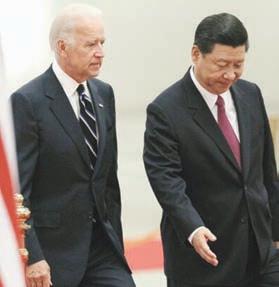
6 minute read
AI vs EU: ChatGPT shakes up Brussels plans for regulation
BrUSSELS
AFP
Advertisement
How do you protect people using new technology when it can radically change from one day to the next?
That’s the riddle the EU faces as it races to regulate artificial intelligence.
AI is in wide use, but the conversational robot ChatGPT has transformed how people view the technology — and how regulators should monitor it to protect against risks.
Created by US startup OpenAI, ChatGPT appeared in November and was quickly seized upon by users amazed at its ability to answer difficult questions clearly, write sonnets or code and provide information on loaded issues.
ChatGPT has even passed medical and legal exams set for human students, scoring high marks.
But the technology also comes with many risks as its learning system and similar competitor models are integrated into commercial applications.
The European Union was already deeply into the process of creating an online regulatory framework, and now must go back to the drawing board to figure out how to effectively regulate AI.
The European Commission, the EU’s executive arm, first announced a plan in April 2021 for an AI rulebook, and the European Parliament hopes to finalise its preferred AI Act text this month.
The EU industry commissioner, Thierry Breton, said MEPs, the commission and member states are working together to “further clarify the rules” on ChatGPT-type tech — known as general purpose AI — systems that have a vast range of functions. OppOrtunities v risks: Social media users have had fun experimenting with ChatGPT output, but it’s not a game. Teachers fear students will use it to cheat, and policymakers fear it will be used to spread misinformation.
“As showcased by ChatGPT, AI solutions can offer great opportunities for businesses and citizens, but can also pose risks,” Breton has said.
“This is why we need a solid regulatory framework to ensure trustworthy AI based on high-quality data.” The plan is for the European Commission, the European Council, which represents the 27 member states, and the parliament to discuss a final version of the AI act from April.
Dragos Tudorache, the MEP overseeing the push to get the AI Act through parliament, said ChatGPT was one the publicly known, news-making example of general-purpose AI and various derivatives. Using what is known as a “large language model”, ChatGPT is an example of generative AI that — operating unguided — can create reams of original content, including images and text, by mining past data. “We will indeed propose a set of rules to govern general-purpose AI, and foundational models in particular,” said Tudorache, a Romanian MEP.
Last week, Tudorache and Italian MEP Brando Benifei presented fellow legislators with a plan to impose more obligations on general-purpose AI, a text which did not feature in the commission’s original proposal. Some experts complain the risks from such systems like ChatGPT were always clear and the warnings were shared with EU officials as work started on the AI Act.
“Our recommendation back then was that we should also regulate AI systems that have a range of uses,” said Kris Shrishak, technology fellow at the Irish Council for Civil Liberties.
But he said it was also just as important to identify the risks from generative AI systems once they are deployed.
China, Russia deepen Comprehensive Strategic Partnership of Coordination for New Era
iSLAMABAD stAFF RePoRt


China-Russia relations go far beyond the bilateral scope and are crucial to the world and the future of mankind, Chinese President Xi Jinping made the remarks when jointly meeting the press with Russian President Vladimir Putin on Tuesday, adding that China and Russia will work together to practice true multilateralism, promote post-pandemic economic recovery and build a multipolar world.
Xi continued his state visit in Russia, meeting with Putin and Prime Minister Mikhail Mishustin on Tues- day. Xi and Putin held two rounds of talks in a restricted session and an expanded format, and the two heads of state signed joint statements after their meeting. The Joint Statement of the People’s Republic of China and the Russian Federation on Deepening the Comprehensive Strategic Partnership of Coordination for the New Era has been signed and released by Xi and Putin at Kremlin has been signed and released by Xi and Putin at Kremlin. On the Ukraine issue, the two sides stressed talks as solution to the crisis and called for respect for security concerns of all countries in resolving the crisis, the Xinhua News Agency reported. son Center, said that the Iran-Saudi Arabia deal has “made a lot of people in the US uncomfortable.”
“The Chinese were just at the right time and the right place with the right relationships,” she said.
“They exploited the opportunity to be a mediator. In fact, they cannot mediate — there’s nothing they can offer.” sHift in tOne: Sun said that China at least was stepping back from “wolf warrior” diplomacy — its shift in the past decade to a shrill, coercive style of dealing with other countries.
“But if the question is have the Chinese been able to come up with a new alternative world order, I don’t think so.”
Evan Feigenbaum, a former US official now at the Carnegie Endowment for International Peace, wrote in an essay that China has already won support for its efforts in parts of the world less invested in the Ukraine war, such as Brazil.
China’s diplomacy can only help, if not by much, in Europe — and there is no thought of winning over the United States, he said.
“Beijing will have already concluded that Washington will dismiss any Chinese diplomatic activity as performative — a kind of Peking opera,” he wrote.
“But the Americans are not China’s audience, so Beijing likely does not much care what Washington thinks.”

World Bank’s IFC to invest about $73m in Mahindra’s last mile mobility unit
profit
ReuteRs
Indian automaker Mahindra and Mahindra Ltd said on Wednesday that World Bank’s private investment arm, International Finance Corp (IFC), will invest 6 billion rupees ($72.58 million) in the company’s last mile electric mobility unit. The investment, which will be in the form of compulsory convertible instruments, will value the unit at 60.20 billion rupees. IFC will own about a 9.97%-13.64% stake in the newly formed company. The new unit will house the last mile mobility division, including three-wheeler and four-wheeler small commercial vehicles, Mahindra said. The investment, which is IFC’s first in an electric vehicle maker in India, comes as the sector is receiving a push from the government. Indian automakers and startups, such as Tata Motors, ElectricPe and Yulu, are jumping into the space and attracting multiple investments. IFC’s financing will help scale up electric mobility in the last mile connectivity, as well as in the development and manufacturing of new generation products, Mahindra said in an exchange filing. Shares of Mahindra were up as much as 1.7%, posting their sharpest intraday percentage gain in nearly three weeks.
10 soldiers killed as fresh Yemen fighting clouds peace efforts
DUBAi AFP
At least 10 soldiers were killed in renewed fighting in Yemen, military sources told AFP, despite diplomatic efforts to halt the long-running war in the Arab world’s poorest country. The clashes took place in oil-producing Marib province, one of the main battlegrounds and the scene of sporadic fighting even during a lull in hostilities over the past year. Iran-backed Huthi rebels attacked a mountainous area and have been engaged in a build-up of forces in the region, two military sources told AFP. “The Huthis launched an attack on hills overlooking Harib district, south of Marib, and made progress on that front, causing the displacement of dozens of families,” one of the sources said, speaking on condition of anonymity. “At least 10 soldiers were killed, in addition to an unknown number of attackers,” the source added. The details of the clash were confirmed by a second military official. The fighting comes a month after at least four soldiers were killed in the same district, and dents new optimism after Saudi Arabia and Iran, who back opposing sides in what amounts to a proxy war, agreed to restore diplomatic ties. An exchange of hundreds of prisoners was agreed this week and Hans Grundberg, UN secretary general’s special envoy for Yemen, has said “intense diplomatic efforts” are underway to strike a peace deal. The Huthis seized control of Yemen’s capital Sanaa in 2014, prompting a Saudi-led military intervention the following year and fighting that has left hundreds of thousands dead, through direct and indirect causes, and triggered one of the world’s worst humanitarian crises. But a UN-brokered ceasefire that took effect last April brought a sharp reduction in hostilities and even though the truce expired in October, fighting has largely remained on hold.




